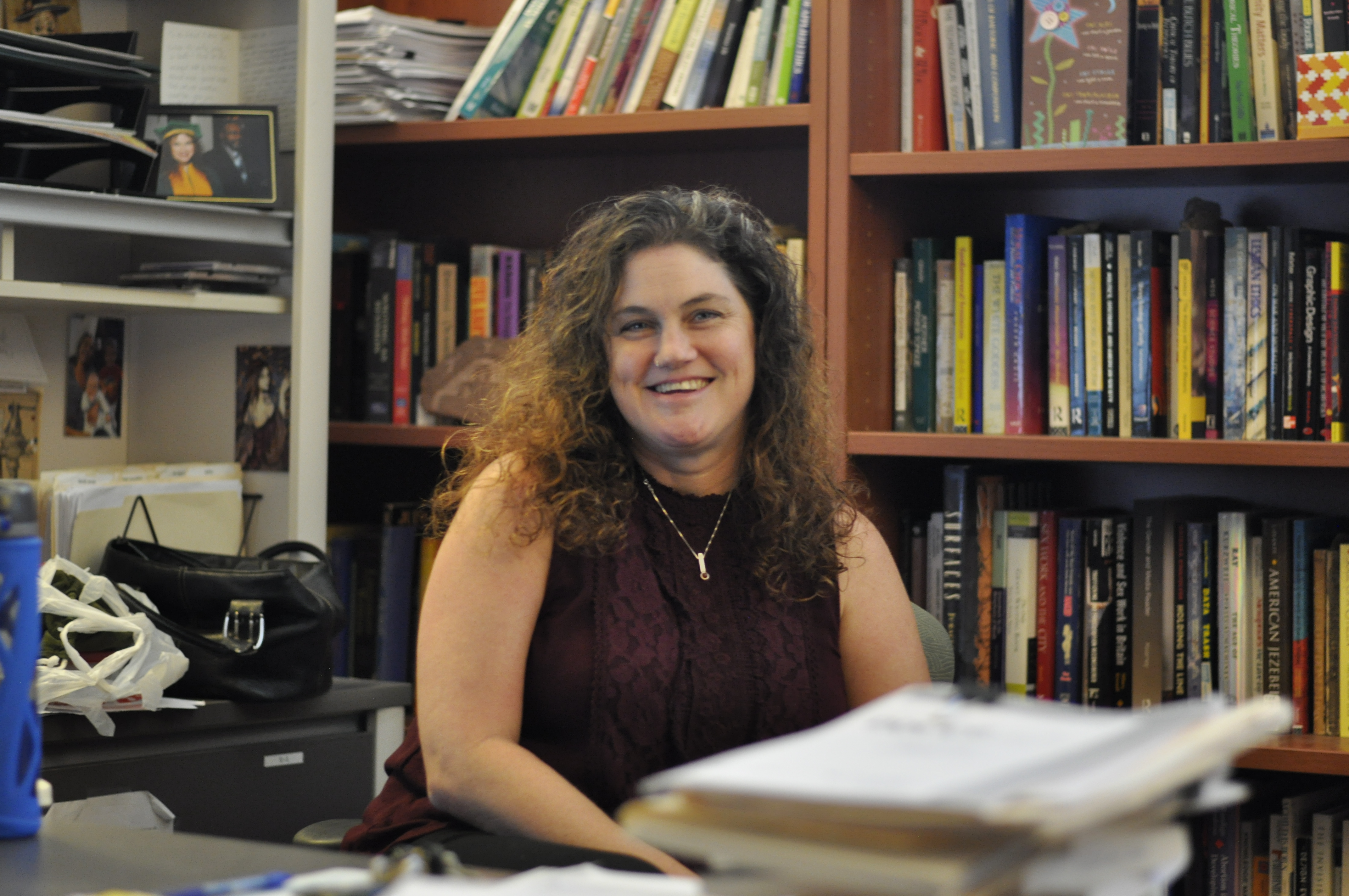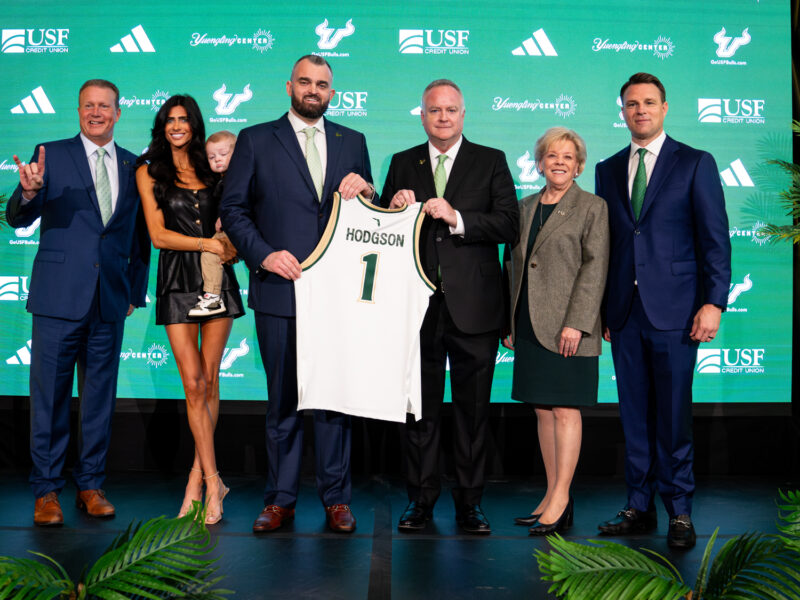By Timothy Fanning and Devin Rodriguez
Citing a 2-year-old incident, the Faculty Senate last month called on the university administration to step up efforts to “reduce sexual harassment and other discrimination” on campus.
In a stern letter delivered to top administrators on Sept. 5, the Senate said the university “contributes to the culture of silence that often surrounds sexual harassment” when it does not inform the campus when a violation occurs.
The faculty leaders criticized what they called “the chaos” in the university’s policies and procedures on reporting and handling sexual harassment, noting that a “person under duress should not have to hunt for these resources” on multiple websites.
Senators also said they feared that “faculty members are not protected legally from potential lawsuits” if they report sexual harassment as required by university policy and state and federal law.
“We urge faculty, students, staff and administrators to reflect deeply on this issue as we move forward,” said the Senate, a seven-member body that serves as the main channel of communication between the faculty and administration. “It is in all of our best interests to ensure that we actively pursue and maintain a safe environment for everyone on campus, and creating that safety is the responsibility of all of us.”
The letter prompted a quick response from administrators, who met with the Senate on Sept. 25.
Interim Regional Chancellor Martin Tadlock assured the faculty leaders that combatting sexual harassment is a top priority, senators said, and Gerard Solis, the USF system’s Tampa-based general counsel, addressed each of the Senate’s main concerns.
The administration also pledged to sharpen the presentation of the university’s written policies on sexual harassment and explore ways to improve training to combat it.
However, those administrators declined to discuss the Senate’s concerns with The Crow’s Nest last week.
Solis and Chitra Iyer, the associate vice chancellor of administration, did not respond to requests for comment.
Tadlock also declined to be interviewed, instead issuing this statement:
“We do not tolerate sexual harassment at USF St. Petersburg. Compliance with USF system policies is of utmost importance. We will continue to increase awareness and education and provide multiple opportunities for everyone who is part of the campus community to learn about these policies.
“The safety and well-being of our students, faculty and staff has been, and will continue to be, our first priority.”
The Faculty Senate’s letter was prompted by the case of Han Reichgelt, who was ousted from his post as regional vice chancellor of academic affairs on Feb. 27, 2015, just eight months after he took the job.
In a short note to faculty and staff that day, then-Regional Chancellor Sophia Wisniewska announced that Reichgelt had resigned, “effective immediately,” and would teach in the College of Business after completing diversity training off campus.
The university declined to elaborate, saying it does not comment on personnel matters.
The reasons for the ouster remained shrouded in secrecy until Nov. 21, 2016, when records obtained by The Crow’s Nest revealed that Reichgelt had propositioned a female professor and made sexually offensive remarks at an off-campus event.
In its letter to Wisniewska, Tadlock and Iyer last month, the Faculty Senate criticized the secretive way administrators handled the Reichgelt case.
“The faculty are concerned that the administration did not provide a significant enough response to the incident and also reveal the reasons for the resignation immediately,” the letter says. “We are concerned that by not directly addressing this issue, we send a message to our campus community that sexual harassment is not something that should be confronted, and stopped, in the most direct manner possible.”
Shortly after receiving the letter, Wisniewska was forced to resign over the way she handled Hurricane Irma. She also did not respond to requests for comment from The Crow’s Nest.
Jill McCracken, an associate professor of verbal and visual arts, and Kathy Arthur, an associate professor of anthropology, wrote the Faculty Senate’s letter, which was released to the rest of the faculty after it went to the administration.
Arthur declined requests to comment on the letter.
When the Reichgelt case “came out again in The Crow’s Nest with all the details,” McCracken said, “we knew that we didn’t have to let it lie. That even though it has been two years, we can still send a message to the administration that says, ‘We want a culture that creates a space that we are comfortable (in) and know we are supported when we speak up.’
“If this (the harassment) happened to me, I would not have felt supported. I would have felt like it was trying to be swept under the rug,” she said.
McCracken said she was happy that administrators responded to the letter by coming to the Faculty Senate meeting.
“I think that many administrators want to move on, but it was good to hear … that if something like this were to happen (again), we are very clear that this kind of behavior is not going to be tolerated,” said McCracken. “If you don’t make a clear statement, you send this message that it’s not even important enough to call out and give words to.”
While she hopes a similar incident never happens again, she said, she will be watching to see how the university handles future cases.
The Senate members said they feel better about another of their concerns – that professors might not be “protected legally from potential lawsuits” if they report sexual harassment, as required by law and university policy.
They were assured that they would be protected, they said.
McCracken also said the university has responded to the Senate’s concern about “the scattered nature” of the university’s policies and procedures on harassment, which are spread around multiple websites, sometimes in illogical places and with broken links.
In preparing the Senate’s letter, McCracken said, “we couldn’t even find the resources for where to go and who to report a sexual harassment complaint (to).”
Since then, she said, she and Iyer have been working together on that problem. The university’s human resources and academic affairs websites are being improved, and there has been discussion about expanding sexual harassment training.
The letter below was originally written on August 31, 2017, by the USFSP Faculty Senate and emailed to former Regional Chancellor Sophia Wisniewska, Interim Regional Chancellor Martin Tadlock and Chitra Iyer, J.D., regional associate vice chancellor for administration.
We are writing to request that the USFSP administration increase their efforts to reduce sexual harassment and other discrimination on this campus. Specifically, we ask that the administration 1) address procedures surrounding reports of harassment and discrimination, 2) make the policies and processes much more explicit in the case of an incident, and 3) send a stronger statement that we will not tolerate sexual harassment or any other kind of discrimination on our campus.
The event involving Han Reichgelt occurred over two years ago. Faculty and staff were informed of Han Reichgelt’s resignation in a brief email on February 27, 2015 from the Chancellor, Sophia Wisniewska. In this email, we were told only that he had resigned and that his resignation was effective immediately. That same day, the Tampa Bay Times published a story about this resignation (http://www.tampabay.com/news/education/college/usf-st-petersburg-official-resigns-formysterious-reasons/2219432). In that article, Chancellor Wisniewska stated his resignation was “in the best interest of this institution” and that he would be appointed a nine-month faculty position and directed to complete appropriate training in the Office of diversity, Inclusion and Equal Opportunity”.
It wasn’t until much later that the details about the event were made much more clear. On April 16, 2016 that the details of the incident were published by both The Crow’s Nest (https://crowsneststpete.com/2016/04/18/reichgelt-ousted-after-complaint/) and later in the Tampa Bay Times. The Crow’s Nest published a letter from the person who reported the incident, and the details of what occurred were made clear. Another article was then published by the Tampa Bay Times on November 22, 2016.
Concern 1: The faculty are concerned that the administration did not provide a significant enough response to the incident and also reveal the reasons for the resignation immediately. It was only revealed through the press two years later, with little response from administration. The faculty want to emphasize we will not tolerate sexual harassment on our campus. We are concerned that by not directly addressing this issue, we send a message to our campus community that sexual harassment is not something that should be confronted, and stopped, in the most direct manner possible.
Solution: We propose that when a situation such as the Reichgelt resignation and sexual harassment arises, the Chancellor issues a public statement that confronts the problematic behavior and in no uncertain terms states we will not tolerate it here at USFSP. The wording could be drafted by the system policy and legal team, but it should make clear that USFSP does not tolerate sexual misconduct, sexual harassment, or discrimination of any kind. By not directly addressing this behavior, USFSP contributes to the culture of silence that often surrounds sexual harassment and other claims of this nature. Unfortunate as these situations are, they provide an opportunity to make a statement that supports our culture of inclusion, safety, and respect for everyone.
Concern 2: In preparing this document, one author tried to locate the policies and procedures to be followed when an incident occurs. Rather than being located in one logical place for USFSP employees, the documents are spread out across the system.
For students, the information is well organized, easily located, and is the first item to come up in a search of the Dean of Students Website. However, there were several problems with the website and pages linked to it.
www.usfsp.edu/dos/sexual-misconduct/what-is-sexual-harassment/
At the initial time of this initial writing (April 2017), the link above took one to a page with a large blank spot in the middle, and the links on this page did not work. On the review process document
(http://www.usfsp.edu/dos/sexual-misconduct/the-reviewprocess/http://www.usfsp.edu/dos/sexual-misconduct/the-review-process/), the link to the Office of Diversity, Inclusion, Equality, and
Opportunity process did not work. Thankfully, both of these errors have been fixed, and yet while the review process document states student or employee, the text is primarily directed at students rather than employees.
Furthermore, the Title IX page is not linked to a sexual harassment page and must be looked up separately, requiring previous knowledge of this legislation
http://www.usfsp.edu/dos/title-ix/
USF Tampa actually produced a clear and helpful document for students (http://www.usf.edu/diversity/documents/resourceguide.pdf), that may also apply to our students, but it is difficult to find. We suggest USFSP make this document or one that applies to our institution available and clearly locatable to our students.
Solution: There is work to be done here, and we propose student government and student affairs work together in a joint committee to make these changes.
Concern 3: For faculty, staff, or administrators, it is much more difficult to locate the appropriate information, policies and procedures that must be followed when sexual harassment occurs. A person under duress should not have to hunt for these resources. Further, the scattered nature of the information does not instill confidence that the incident will be efficiently and appropriately handled.
The following documents were found in various places in a USFSP search for Sexual Harassment: ● University Policy Chapter 9 under Academic Affairs o https://www.usfsp.edu/academic-affairs/files/2014/10/Chapter9.pdf
- Collective Bargaining Agreement under Human resources o www.usfsp.edu/hr/files/2012/12/AFSCME.pdf
- Diversity and equal opportunity under human resources o http://regulationspolicies.usf.edu/policies-and-procedures/pdfs/policy-0007.pdf
- The faculty Handbook under academic affairs o https://www.usfsp.edu/academic-affairs/files/2015/05/USFSP-FacultyHandbook.pdf o ● Title IX resources under some general files o https://www.usfsp.edu/dos/files/2016/05/titleix-resources.pdf
- Campus Security Report under Campus Police o https://www.usfsp.edu/university-police-department/files/2016/10/2016USFSP-Clery-ASR.pdf
- USF Progress Steps for Disciplinary Action pdf under o www.usfsp.edu/hr/files/2012/12/progressive-steps-disciplinary-action.pdf
- Eventually in a link to the USF System there is a website with a system Policy. o http://regulationspolicies.usf.edu/policies-and-procedures/pdfs/policy-0004.pdf
- Ombuds Office link would be useful as well
In the chaos of all this documentation that is scattered throughout the website, it is unclear what the procedures are for staff, faculty, and administrators. And there are many unanswered questions that should be addressed, most specifically about the process.
As we move forward we want assurance that there is transparency in our procedures and policies. Specifically, we ask the following questions:
- What are the guidelines for reporting sexual harassment?
- What steps should be followed?
- Who is the Title IX Coordinator on campus for faculty and staff?
- What procedures are put in place to make sure the victim is immediately protected—both physically as well as their employment status—on campus?
- Who protects the rights of the victim?
- Must the victim hire their own lawyer?
- Must the victim take a leave of absence or remove themselves from their positions to feel safe from the aggressor—or will the aggressor be placed on leave?
- Is there a “no contact directive”?
- Who makes the final decisions concerning the incident?
- Who determines the outcome of the incident report?
- Who determines if the perpetrator is fired or transferred to another position and, if so, what position?
- What constitutes a “fireable” offense?
- Can we assure that faculty and staff will be provided indemnification for reporting on Title IV instances?
Solution: Form a committee comprised of faculty, human resources, union representatives, and our legal team to address and answer these questions as well as to solidify and make easily available our policies and procedures related to these matters.
Concern 4: We are required to report sexual harassment by university policy, state, and federal law, and yet faculty members are not protected legally from potential lawsuits related to this reporting.
Solution: Work with the USF system to obtain indemnification policy to protect faculty and others if they report sexual harassment, which protects the person reporting while also sending the message that reporting is the priority, rather than protecting oneself from potential financial hardship. We also recommend USFSP, through the committee recommended in Concern 3, to create a policy whereby anyone can report anonymously and be protected from perceived and material hardship.
We urge faculty, students, staff, and administrators to reflect deeply on this issue as we move forward. It is in all of our best interests to ensure that we actively pursue and maintain a safe environment for everyone on campus, and creating that safety is the responsibility of all of us in the USFSP community. It requires vigilance, tenacity, and being brave enough to stand up against behavior that is inappropriate and hurts others. We want to thank the faculty member who reported this egregious behavior and was courageous enough to face the possibility of further harassment or retribution. Moving forward as a community, we need to protect each other, and we need assurances that appropriate procedures, not just policies, are in place.
We request that an answer or discussion of these concerns and proposed solutions be addressed to the Faculty Senate by October 23, 2017.
Thank you for your continued commitment to USFSP.
Respectfully,
Faculty Senate Co-authored with Kathy Arthur



